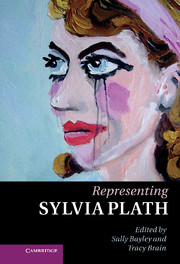Book contents
- Frontmatter
- Contents
- Illustrations
- Notes on contributors
- Acknowledgements
- Abbreviations
- Introduction
- Part I Contexts
- Part II Poetics and composition
- Part III Representation
- Chapter 9 Confession, contrition and concealment: evoking Plath in Ted Hughes’s Howls & Whispers
- Chapter 10 Fictionalizing Sylvia Plath
- Chapter 11 Primary representations
- Bibliography
- Index
Chapter 11 - Primary representations
three artists respond to Sylvia Plath
from Part III - Representation
Published online by Cambridge University Press: 07 September 2011
- Frontmatter
- Contents
- Illustrations
- Notes on contributors
- Acknowledgements
- Abbreviations
- Introduction
- Part I Contexts
- Part II Poetics and composition
- Part III Representation
- Chapter 9 Confession, contrition and concealment: evoking Plath in Ted Hughes’s Howls & Whispers
- Chapter 10 Fictionalizing Sylvia Plath
- Chapter 11 Primary representations
- Bibliography
- Index
Summary
Adolescent Plath: The Girl Who Would Be God
Suzie Hanna
playing at god
The inspiration for creating a short mixed-media film entitled The Girl Who Would Be God was found in Sylvia Plath’s diary entry of 13 November 1949. Her vivid descriptions of her domestic environment, and in particular the self-conscious sense of her emerging adult identity on the threshold between childhood and womanhood, seemed to contain an intrinsically filmic narrative: an immediate sense of mise en scène with a strong protagonist. The passage overflows with a sense of Plath’s emerging being; a young ‘Scarlett O’Hara’ debutante, full to the brim with self, blissful in her middle teenage years and wanting to retain this.
Plath’s adolescent narrative constructs the figure of a girl who is self-consciously writing in her room. It describes her view of the autumnal landscape framing an idyllic house (Fig. 2). In the background as she types are reminders of her recent romantic memories; these include the images of boyfriends that she has pinned up on her wall and a cardboard theatre that sits on her desk (Fig. 3). Casting herself as the protagonist in her own self-devised drama, the adolescent Plath is sentimental about her ebbing childhood and fearful of the future, including the possibility of marriage; at the same time she mines the power of her own enormous creative and intellectual potential.
- Type
- Chapter
- Information
- Representing Sylvia Plath , pp. 203 - 234Publisher: Cambridge University PressPrint publication year: 2011



